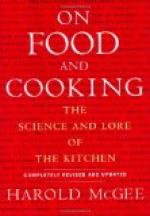Some people suppose the manner of preparing tea has much to do with its deleterious effects, and that by infusion for two or three minutes only, the evils resulting from the tannin will be greatly lessened. This, however, is a delusion, if the same amount of tea be used proportionate to the water; for tannin in its free state, the condition in which it is found in tea is one of the most readily soluble of substances; and tea infused for two minutes is likely to hold nearly as much tannin in solution as that infused for a longer period.
Tea is not a food, and it can in no wise take the place of food, as so many people attempt to make it, without detriment to health in every respect.
Coffee, cocoa, and chocolate rank in the same category with tea, as beverages which are more or less harmful. Coffee contains caffein, a principle identical with theine and a modified form of tannin, though in less quantity than tea. Cocoa and chocolate contain substances similar to theine and equally harmful, though usually present in much less proportion than in tea.
Custom has made the use of these beverages so common that most people seldom stop to inquire into their nature. Doubtless the question arises in many minds; If these beverages contain such poisons, why do they not more commonly produce fatal results?—Because a tolerance of the poison is established in the system by use, as in the case of tobacco and other narcotics and stimulants; but that the poisons surely though insidiously are doing their work is attested by the prevalence of numerous disorders of the digestive and nervous systems, directly attributable to the use of these beverages.
Both tea and coffee are largely adulterated with other harmful substances, thus adding another reason why their use should be discarded. It is stated on good authority that it is almost impossible to obtain unadulterated ground coffee.
In view of all these facts, it certainly seems wisest if a beverage is considered essential, to make use of one less harmful. Hot milk, hot water, hot lemonade, caramel coffee, or some of the various grain coffees, recipes for which are give in the following pages, are all excellent substitutes for tea and coffee, if a hot drink is desired.
RECIPES
BEET COFFEE.—Wash best beets thoroughly, but do not scrape; slice, and brown in a moderate oven, taking care not to burn. When brown, break in small pieces and steep the same as ordinary coffee.
CARAMEL COFFEE.—Take three quarts best bran, one quart corn meal, three tablespoonfuls of molasses; mix and brown in the oven like ordinary coffee. For every cup of coffee required, use one heaping tablespoonful of the caramel. Pour boiling water over it, and steep, not boil, for fifteen or twenty minutes.




